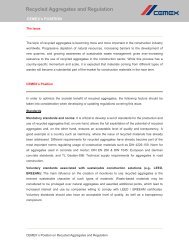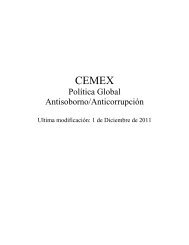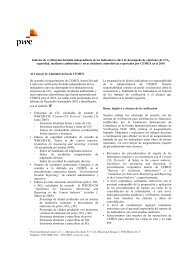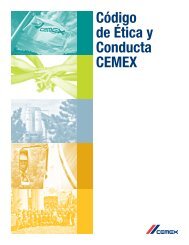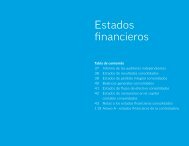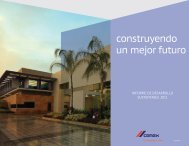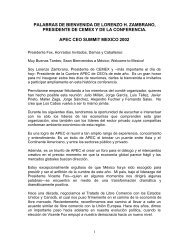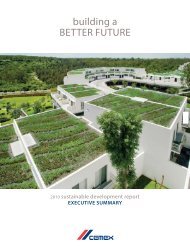building a STRONGER foundation - Cemex
building a STRONGER foundation - Cemex
building a STRONGER foundation - Cemex
You also want an ePaper? Increase the reach of your titles
YUMPU automatically turns print PDFs into web optimized ePapers that Google loves.
C) OTHER CONTINGENCIES FOR LEGAL PROCEDURES<br />
CEMEX, S.A.B. DE C.V. AND SUBSIDIARIES<br />
Notes to the Consolidated Financial Statements – (Continued)<br />
As of December 31, 2010, 2009 and 2008<br />
(Millions of Mexican pesos)<br />
Finally, there are certain legal proceedings in which a negative resolution for CEMEX may represent, among others, the revocation of<br />
operating licenses or the assessment of fines, whereby CEMEX may experience a decrease of future revenues, an increase in operating costs<br />
or a loss. Nevertheless, as of the date of these financial statements, in some cases, it is not possible to quantify the impact. As of December<br />
31, 2010, the most significant other contingencies were the following:<br />
Pursuant to amendments to the Mexican income tax law effective on January 1, 2005, Mexican companies with investments in entities<br />
incorporated in foreign countries whose income tax liability is less than 75% of the income tax that would be payable in Mexico, are<br />
required to pay taxes in Mexico on indirect revenues, such as dividends, royalties, interest, capital gains and rental fees obtained by such<br />
foreign entities, provided, however, that such revenues are not derived from entrepreneurial activities in such countries. CEMEX<br />
challenged the constitutionality of the amendments before the Mexican federal courts. In September 2008, the Supreme Court of Justice<br />
ruled the amendments were constitutional for tax years 2005 to 2007. Since the Supreme Court's decision does not pertain to the amount of<br />
taxes due or other tax obligations, CEMEX will self-assess any taxes due through the submission of amended tax returns. CEMEX has not<br />
yet determined the amount of tax or the periods affected, but the amount could be material. If the Mexican tax authorities do not agree with<br />
our self-assessment of the taxes due for past periods, they may assess additional amounts of taxes past due, which could be material and<br />
may impact CEMEX’s cash flows.<br />
On June 5, 2010, the Secretaría Distrital de Ambiente de Bogotá, the District of Bogota’s environmental secretary (or the “environmental<br />
secretary”), ordered the suspension of the mining activities of CEMEX Colombia at El Tunjuelo quarry, located in Bogotá, Colombia, as a<br />
temporary injunction. As part of the temporary injunction, Holcim Colombia and Fundación San Antonio (local aggregates producers), which<br />
also have mining activities located in the same area of El Tunjuelo quarry, have also been ordered to suspend mining activities in that area. The<br />
environmental secretary alleges that during the past 60 years CEMEX Colombia and the other companies included in the temporary injunction<br />
have illegally changed the course of the Tunjuelo River, have used the percolating waters without any permission and have improperly used the<br />
edge of the river for mining activities. In connection with the temporary injunction, on June 5, 2010, CEMEX Colombia received a formal<br />
notification from the environmental secretary informing about the initiation of proceedings to impose fines based on the previously mentioned<br />
presumed environmental violations against CEMEX Colombia. CEMEX Colombia responded to the temporary injunction by requesting that it<br />
be revoked based on the fact that the mining activities at El Tunjuelo quarry are supported by the corresponding authorizations required by the<br />
applicable environmental laws and that all the environmental impact statements submitted by CEMEX Colombia have been reviewed and<br />
permanently authorized by the Ministerio del Medio Ambiente, Vivienda y Desarrollo Territorial. On June 11, 2010, the local authorities in<br />
Bogotá, in compliance with the environmental secretary’s decision, sealed off the mine to machinery and prohibited the removal of our<br />
aggregates inventory. Although there is not an official quantification of the possible fine, the environmental secretary has publicly declared that<br />
the fine could be as much as 300 billion Colombian pesos (US$157 or Ps1,941). The temporary injunction does not currently compromise the<br />
production and supply of ready-mix concrete to our clients in Colombia. CEMEX Colombia is analyzing its legal strategy to defend itself<br />
against these proceedings. At this stage, we are not able to assess the likelihood of an adverse result or potential damages which could be borne<br />
by CEMEX Colombia.<br />
In October 2009, CEMEX Corp., one of CEMEX’s subsidiaries in the United States, and other cement and concrete suppliers were named<br />
as defendants in several purported class action lawsuits alleging price-fixing in Florida. The purported class action lawsuits are of two<br />
distinct types: a) the first type were filed by entities purporting to have purchased cement or ready-mix concrete directly from one or more<br />
of the defendants; and b) the second group of plaintiffs are entities purporting to have purchased cement or ready-mix concrete indirectly<br />
from one or more of the defendants. Underlying all purported suits is the allegation that the defendants conspired to raise the price of<br />
cement and hinder competition in Florida. On October 12, 2010, the court granted in part the defendants’ motion, dismissing from the case<br />
all claims relating to cement and reducing the applicable time period of the plaintiffs’ claims. On October 29, 2010, the plaintiffs filed<br />
further amended complaints pursuant to the court’s decision. On December 2, 2010, CEMEX moved to dismiss the amended complaint<br />
filed by the indirect purchaser plaintiffs based on lack of standing. CEMEX also answered the complaint filed by the direct purchaser<br />
plaintiffs. CEMEX continues to believe that the lawsuits are without merit and intends to defend them vigorously. At this stage, we are not<br />
able to assess the likelihood of an adverse result or potential damages which could be borne by CEMEX Corp.<br />
In October 2008, in connection with the nationalization of CEMEX’s assets in Venezuela (note 11A), CEMEX’s subsidiaries in Holland,<br />
which held CEMEX’s shares in CEMEX Venezuela, submitted a complaint seeking international arbitration to the International Centre for<br />
Settlement of Investment Disputes (“ICSID”) following the Venezuelan Government's confiscation of assets, deprivation of rights of<br />
CEMEX Venezuela and the initiation of the expropriation of CEMEX's Venezuelan business. On July 27, 2010, the ICSID tribunal heard<br />
arguments on the jurisdictional objections raised by the Republic of Venezuela and issued its decision in favor of jurisdiction on December<br />
30, 2010. The proceedings are now expected to proceed to the merits phase of the arbitration. CEMEX is unable at this preliminary stage to<br />
estimate the likely range of potential recovery or to determine what position the Republic of Venezuela will take in these proceedings, the<br />
nature of the award that may be issued by the ICSID tribunal or the likely extent of collection of any possible monetary award issued.<br />
F-57



